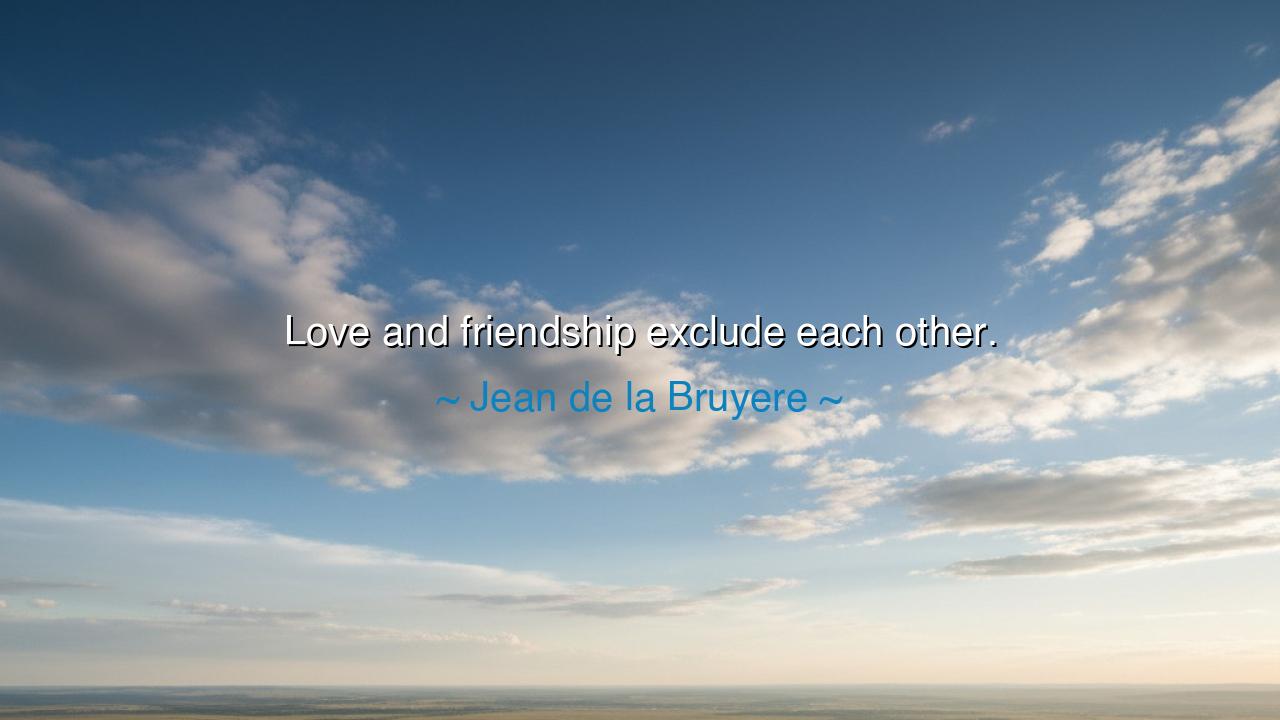
Love and friendship exclude each other.






“Love and friendship exclude each other.” Thus wrote Jean de La Bruyère, the keen observer of human nature, whose pen revealed both the brilliance and frailty of the human heart. In this brief and piercing statement, he delivers not a commandment, but a lament—a recognition of the tension between two of life’s most sacred bonds. For to him, love and friendship, though born of the same longing for connection, walk different paths: one inflamed by passion and possession, the other governed by calm and equality. He saw that where love burns too brightly, friendship withers in its shadow; and where friendship flourishes in peace, love’s consuming fire cannot endure.
The origin of this thought lies in the salons and courts of seventeenth-century France, where La Bruyère lived among men and women who adorned their emotions with reason, yet were tormented by desire. In his Characters, he studied the hearts of lovers and friends with the precision of a philosopher and the melancholy of a poet. He saw that love—that intoxicating force which demands possession, exclusivity, and sacrifice—often destroys the serenity and balance that friendship requires. For friendship is a union of equals, built upon respect, trust, and constancy; while love, in its romantic form, is an empire of the heart, filled with jealousy, dependence, and longing. He concluded that the two, though kindred in spirit, cannot coexist in their purest forms without corrupting one another.
In love, there is a fierce desire to claim and to be claimed—to belong utterly to another. The lover yearns not for companionship alone, but for fusion, for the vanishing of distance between souls. Yet friendship demands freedom. It thrives in mutual respect, in the space that allows each to remain wholly themselves. Love, by its nature, consumes; friendship, by its nature, preserves. And so La Bruyère saw them as two celestial bodies whose orbits cross but cannot merge, for if they do, one is lost to the gravity of the other. Love and friendship exclude each other not because they are enemies, but because each asks of the heart what the other cannot give.
Consider, for example, the tragic tale of Antony and Cleopatra. Before passion bound them in its fatal embrace, there was between them a bond of admiration and alliance—a kind of noble friendship. But once love took hold, all moderation vanished. Antony abandoned his duty, his country, and his reason; Cleopatra demanded not partnership, but worship. Their love burned with such ferocity that it left no room for friendship’s quiet strength. In the end, both perished—not because they lacked devotion, but because devotion, when untempered by friendship, becomes destruction. Their story is the living proof of La Bruyère’s truth: that the fires of love can consume the gentler light of friendship, leaving behind only ashes and memory.
Yet La Bruyère’s insight is not entirely one of despair. He reminds us that every bond in life has its own nature, and that harmony comes not from confusion, but from understanding. Love has its place, noble and divine when it uplifts rather than enslaves. Friendship, too, is sacred, when it shelters the soul without demanding its surrender. The tragedy lies not in their difference, but in our desire to make them one. Many have sought to transform friendship into love, or love into friendship, and in so doing have lost both. The wise accept that each has its season: love, the tempest that awakens the soul; friendship, the calm that gives it rest.
Still, there are rare and blessed unions where both coexist—not perfectly, but beautifully. Such was the bond between Abélard and Héloïse, the scholar and his brilliant student. Their love began in passion and defiance, yet, after suffering, it matured into friendship—one forged in understanding, mutual respect, and shared intellect. Though separated by vows and tragedy, their letters reveal a relationship that transcended the physical. What began as love became friendship, purified by pain and remembrance. Perhaps La Bruyère, in his wisdom, would have called this not a contradiction of his truth, but its reconciliation—the transformation of one form of affection into another, no longer at war.
Let this, then, be the lesson: know the nature of your bonds. Do not mistake the peace of friendship for the passion of love, nor the fire of love for the constancy of friendship. Each has its beauty, its purpose, its rightful place in the order of life. Seek love with courage, knowing its flames can both warm and wound; cherish friendship with reverence, for it endures when passions fade. And when the heart finds itself caught between the two, let wisdom guide it—neither to deny love nor to destroy friendship, but to honor both by keeping them true to themselves.
For as Jean de La Bruyère reminds us, the soul cannot give itself wholly to both. Love and friendship exclude each other—yet in understanding their difference, we find harmony. Love exalts the heart; friendship steadies it. And though they may not dwell in the same house, they both lead us, in their own way, toward that eternal truth which every soul seeks: the desire not merely to be loved, but to be known, and still be cherished.






AAdministratorAdministrator
Welcome, honored guests. Please leave a comment, we will respond soon